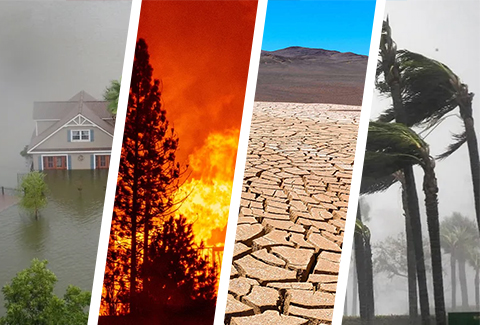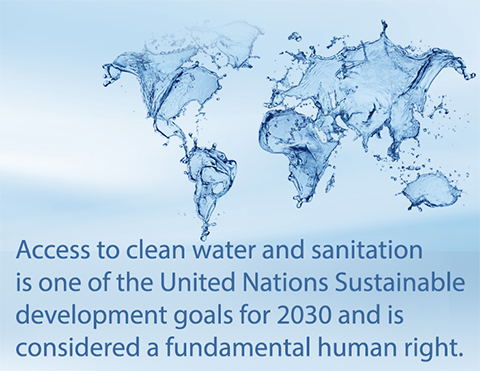 |
 |
|
February 28, 2024 Not enough water or too much? The Almighty Lord is the provider of water, and its maker, and hath decreed that it be used to quench man's thirst, but its use is dependent upon His Will. If it should not be in conformity with His Will, man is afflicted with a thirst which the oceans cannot quench." —`Abdu'l-Bahá

Droughts and floods are not something that people in Ottawa think about as local problems. We have easy access to clean water to drink, flush or swim in. But climate change is bringing foreign problems closer to home. Local farmers are worried about whether less snow this winter will mean drought conditions during the coming growing season. In recent years unusually heavy rains have caused serious flooding in our city. The problems of extreme weather events and unusual weather patterns are becoming more common. In a presentation to the Ottawa 613 Environmental Café in February, Darren Hedley, a University of Calgary professor and member of the Association for Bahá’í Studies Climate and Environment Working Group gave a sobering overview of the issue of water security and how it relates to climate change. He noted that a 1 degree Celsius increase in temperature increases the water in the air (through evaporation and transpiration) by 7 per cent – which leads to more extreme weather events – more droughts, wildfires, heavy rains and severe storms. At the same time, Hedley, a member of the Local Spiritual Assembly of Calgary, says 4 billion people now face scarcity at least one month a year and 50% of the world’s people will face severe water stress in the second half of this century. Hedley shared a map that showed parts of the world with serious water shortages which include a large part of California and Australia as well as large sections of Africa and of Asia. He also noted that 81% of species dependent on inland water and wetlands have declined in number since 1970.  Access to clean water and sanitation is one of the United Nations Sustainable development goals for 2030 and is considered a fundamental human right. In many places, water has to be carefully managed to make sure everyone has enough. Hedley says this can mean managing demand by limiting water use, as well as taking actions to prevent severe runoff from rains or to increase water absorption by planting vegetation that hold water in the soil and preserving natural wetlands. Technological solutions include desalination and using better sensors to monitor demand peaks times and detect leaks. Hedley described how Cape Town, South Africa in 2018 reached a low point of 15% of water in their reservoir and had to find a way to manage the supply to make sure everyone had the water they needed. They started charging fees for water, reduced leakages from the system and rationed water use to about 50 litres a day per resident. (For comparison, an average Canadian uses more than 500 litres per day.) Hedley challenged us to think about our own water footprints and provided this link: https://www.watercalculator.org/ Not having enough water means farmers cannot grow crops or food to sustain their families and has forced many people in Latin America and Mexico to abandon their villages and migrate North to the border of the United States. Similar issues in Africa are driving climate refugees to Europe. In parts of Africa commercial enterprises are setting up kiosks where people buy buckets of water, or communal wells where tokens are used to buy water. This fee for service will help pay for the maintenance and sustainability of a water supply. In many places we are overdrawing from aquifers or surface water, which will lead to water scarcity. There is now competition between households and corporations or large farming operations in many places across the world – even in Canada. We have seen recent news stories of Alberta municipalities limiting water use for mining or fracking. Climate change has brought water scarcity problems to parts of Canada – something we thought would never come to our doorstep. A recent Global Commission on the Economics Water in 2022 looked at how we can make sure everyone has an adequate supply of clean water. Hedley says it will require not only financing but also good governance, political stability and transboundary cooperation to ensure everyone has a secure supply of clean water. |
|
|